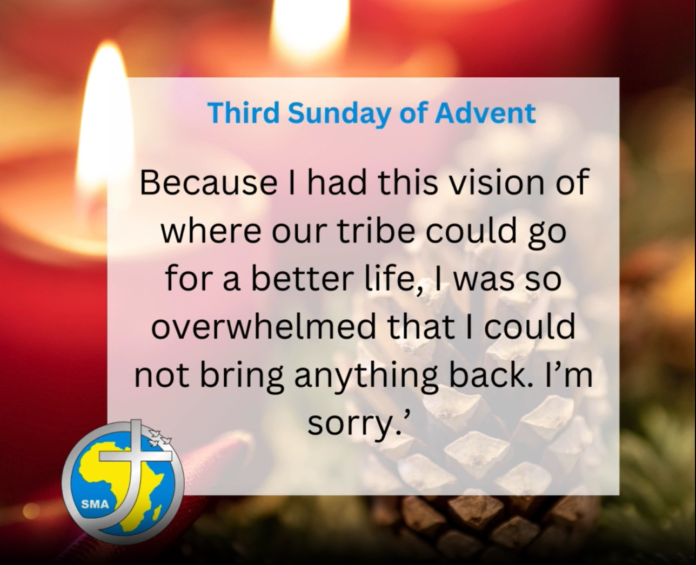Readings: Isaiah 61:1-2,10-11; 1 Thessalonians 5:16-24; John 1:6-8,19-28
Theme: Waiting in Joyful Hope
I will begin with a story ‘There was once an Indian tribe whose camp was at the base of a great mountain. The land was rugged and life was hard, but the Native Americans persevered. Their chief had led them with wisdom and fairness for many years, but now death was approaching. He called his three sons to him and said, “I am dying, and one of you will succeed me as leader of our tribe. I want each of you to climb our holy mountain and bring back something beautiful. Return here in three days; whoever brings the most outstanding gift will become the new chief.” The young men took their father’s words very seriously, and went off with a sense of purpose and determination; each returned three days later.
The first son brought his father a flower, which he had picked near the summit of the mountain; it was very rare and beautiful, and the father was pleased. The second son handed his father a beautiful stone, which he found in a crevice in the side of the mountain; it was colourful and smooth, having been polished by the rain and the wind, and again the father was pleased. The third son approached, but his hands were empty. He said, “Father, I have brought back nothing to show you. When I stood on the top of the mountain, I saw that on the other side there is a beautiful land filled with green pastures, lush forests, and a crystal lake. Because I had this vision of where our tribe could go for a better life, I was so overwhelmed that I could not bring anything back. I’m sorry.” To the young man’s great surprise, his father answered, “You shall be our tribe’s new leader, for you have brought back the most precious thing of all: the gift of a vision for a better future”’ (Paul Wharton)
A well know liturgist, writing on the Advent Liturgy, describes it as a continuous song of hope. Today’s liturgy especially captures this mood of joyful hope. Christianity is essentially a religion of hope. At its core is a vision of a better and brighter future for all humanity and, indeed, for all creation – a hope based on the conviction that God has come to dwell among us to heal, redeem, and transform our lives. This is what he has done for us in and through his Son, who is, as Isaiah announces in our first reading, the anointed one ‘sent to bring good news to the poor, to bind up hearts that are broken; to proclaim liberty to captives, and freedom to those in prison’ (Is 61:1-2). In him, God’s reign of justice, peace and love was established on earth. And so, Christ is our hope, our Light, the light to which, as our gospel reading today states, John the Baptist ‘came as a witness, a witness to speak for the light’ (Jn 1:7).
Yet, in spite of Christ’s coming, we know that our world is not as God wants it to be. Horrific wars, injustice, exploitation, violence and hatred continue to darken our world. Confidence in the progress of civilization has been undermined by the appearance of new forms lawlessness, greed and selfishness. Political leaders – some democratically elected – sow hatred and division instead of justice and reconciliation. New forms of populism and fascism, spread by social media, replace reason and dialogue in political discourse. In a recently published novel, Prophet Song, which won the 2023 Booker prize, Paul Lynch depicts the shocking plight of a family striving to survive in an Ireland, gripped by fascism – a dystopian vision not as fanciful as we might think. A drugs culture, spiraling out of control in many countries, including Ireland, destroys the lives of millions. The gap between the rich and poor continues to widen, and, despite the warnings of scientists and climate activists, world leaders, meeting at present in Dubai (COP 28), fail to take decisive action to save ‘our common home’.
In circumstances such as these it is hard to be optimistic, but Christian hope must not be confused with optimism. This hope is not naive about the reality of sin and human failure. The hope we celebrate in our Eucharist, and to which we strive to witness in our lives, is a hope that can look beyond the brokenness of our world and the messiness of our lives, because it is based on our faith in Christ. It is hope for a new life that rises out of the ashes of death and decay. Such hope is not confined by the limits of our vision, or our human resources. Even when we are tempted to lose heart, God does not give up on us. His ultimate purpose in creation, reaffirmed in the incarnation, and gloriously manifested in the Resurrection of his Son, cannot fail.
We may feel overwhelmed at times like these when we hear that, because of the horrific slaughter in ‘The Holy Land’, there will be no Christmas Mass in Bethlehem this year. Yet, even when situations appear almost hopeless, we continue to hope, convinced that God will complete what he began when he sent us his Son. We may not know how or when this completion will happen, but, as surely as the dawn follows the darkness of night, it will happen. It this hope that sustains us in these grim times, a hope based on the certainty that, in the words of St Paul, nothing can ‘come between us and the love of God, known to us in Christ Jesus, our Lord’ (Rm 8:39).
Fr Michael McCabe SMA
To listen to an alternative Homily for this Sunday, from Fr Tom Casey of the SMA Media Centre, Ndola, Zambia please click on the play button below.
|
|

